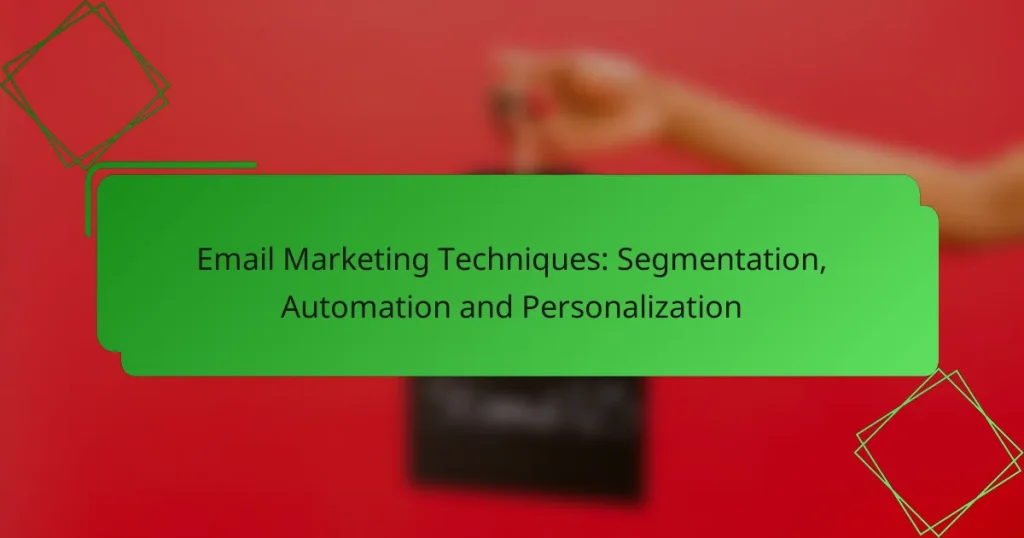Marketing digital products effectively requires a strategic blend of various techniques, including content marketing, email outreach, and social media advertising. By leveraging these strategies, businesses can engage their target audiences, enhance brand visibility, and ultimately drive sales. Additionally, optimizing for search engines is essential to attract organic traffic and connect with potential customers actively seeking solutions.
Sales Funnel: Stages, Conversion Tactics and Customer Journey
Competitor Marketing Strategies: Analysis, Differentiation and Insights
Influencer Partnerships: Reach, Credibility and Engagement
Webinars: Engagement, Content Delivery and Lead Generation
Social Media Strategies: Engagement, Content Planning and Audience Targeting
SEO Best Practices: Keywords, On-Page Optimization and Link Building
What are effective marketing strategies for digital products?
Effective marketing strategies for digital products include a mix of content marketing, email marketing, social media advertising, search engine optimization, and influencer partnerships. Each strategy plays a crucial role in reaching and engaging target audiences to drive sales and brand awareness.
Content marketing
Content marketing focuses on creating valuable, relevant content to attract and engage a target audience. This can include blog posts, videos, infographics, and eBooks that provide solutions or insights related to your digital product.
To succeed, ensure your content is optimized for search engines and addresses the needs of your audience. Regularly updating your content and promoting it through various channels can enhance visibility and drive traffic.
Email marketing
Email marketing is a direct way to communicate with potential and existing customers, promoting your digital products through newsletters, promotional offers, and personalized content. Building a quality email list is essential for effective campaigns.
Segment your audience based on their interests and behaviors to tailor your messages. Aim for a consistent sending schedule and monitor open and click-through rates to refine your approach.
Social media advertising
Social media advertising allows you to target specific demographics and interests, making it a powerful tool for promoting digital products. Platforms like Facebook, Instagram, and LinkedIn offer various ad formats to showcase your offerings.
Set clear objectives for your campaigns, whether it’s brand awareness or direct sales. Utilize A/B testing to determine which ads perform best and adjust your strategy accordingly.
Search engine optimization
Search engine optimization (SEO) involves optimizing your website and content to rank higher in search engine results. This increases organic traffic and visibility for your digital products.
Focus on keyword research, on-page optimization, and building backlinks. Regularly updating your content and ensuring your site is mobile-friendly can significantly impact your SEO performance.
Influencer partnerships
Influencer partnerships leverage the reach and credibility of individuals with a significant following to promote your digital products. Collaborating with influencers can enhance brand trust and expand your audience.
Choose influencers whose values align with your brand and who have an engaged audience. Develop clear agreements on deliverables and compensation to ensure a successful partnership.
How can I leverage social media for digital product marketing?
Leveraging social media for digital product marketing involves using platforms to reach and engage your target audience effectively. By utilizing targeted ads, engaging content, and community-building strategies, you can enhance visibility and drive sales.
Targeted ads on Facebook
Facebook’s targeted ads allow you to reach specific demographics based on interests, behaviors, and location. This precision helps in maximizing your ad spend by ensuring your digital products are shown to the most relevant users.
To create effective ads, consider using eye-catching visuals and clear calls to action. Test different ad formats, such as carousel ads or video ads, to see which resonates best with your audience.
Monitor your ad performance regularly and adjust your strategy based on engagement rates and conversion metrics to optimize your campaigns.
Engagement through Instagram stories
Instagram stories are a powerful tool for engaging your audience in a more casual and interactive way. Use stories to showcase product features, share customer testimonials, or offer behind-the-scenes content that builds a connection with your brand.
Incorporate polls, questions, and swipe-up links to drive interaction and direct traffic to your product pages. Aim to post stories consistently, as they can keep your audience engaged and informed about new offerings.
Building communities on Discord
Discord is an excellent platform for building a dedicated community around your digital products. By creating a server, you can foster discussions, provide support, and gather feedback directly from your users.
Encourage members to share their experiences and tips related to your products, which can enhance loyalty and create a sense of belonging. Regularly host events or Q&A sessions to keep the community active and engaged.
Consider offering exclusive content or early access to new products for community members to incentivize participation and strengthen relationships.
What role does SEO play in marketing digital products?
SEO is crucial for marketing digital products as it enhances visibility on search engines, driving organic traffic to your website. By optimizing your content for relevant keywords, you can attract potential customers actively searching for solutions you offer.
Keyword optimization
Keyword optimization involves researching and selecting the right keywords that your target audience uses to find digital products. Focus on long-tail keywords, which are more specific and often have lower competition, making it easier to rank higher in search results.
Utilize tools like Google Keyword Planner or SEMrush to identify keywords with good search volume and relevance. Aim for a mix of high-volume and niche keywords to balance traffic and competition.
On-page SEO techniques
On-page SEO techniques include optimizing individual web pages to rank higher and earn more relevant traffic. Key elements include using keywords in titles, headings, and throughout the content, as well as ensuring that meta descriptions are compelling and informative.
Additionally, focus on improving page load speed and mobile responsiveness, as these factors significantly impact user experience and search rankings. Tools like Google PageSpeed Insights can help identify areas for improvement.
Link-building strategies
Link-building strategies are essential for increasing your site’s authority and improving search rankings. Start by creating high-quality content that others want to link to, such as informative blog posts, infographics, or case studies.
Engage in guest blogging on reputable sites within your industry to earn backlinks. Also, consider reaching out to influencers or industry leaders to share your content, which can lead to organic link acquisition.
What are the best platforms for selling digital products?
The best platforms for selling digital products include Shopify, Gumroad, and Amazon Kindle Direct Publishing. Each platform caters to different types of digital products and offers unique features that can enhance your sales strategy.
Shopify for e-commerce
Shopify is a leading e-commerce platform that allows you to create an online store for selling digital products like software, music, or courses. It offers customizable templates, secure payment processing, and various apps to enhance functionality.
When using Shopify, consider the monthly subscription fees and transaction costs, which can vary based on your chosen plan. Make sure to optimize your store for SEO and mobile devices to attract more customers.
Gumroad for creators
Gumroad is designed specifically for creators to sell digital products such as e-books, music, and artwork. It provides a straightforward setup process and allows you to sell directly to your audience without needing a full-fledged website.
Gumroad charges a small percentage of each sale, making it accessible for new creators. Utilize its marketing tools, like discount codes and affiliate programs, to increase your reach and sales.
Amazon Kindle Direct Publishing for e-books
Amazon Kindle Direct Publishing (KDP) is an excellent platform for authors looking to sell e-books. It allows you to publish your book quickly and reach millions of readers on Amazon’s marketplace.
With KDP, you can earn royalties of up to 70% on your sales, depending on the pricing and distribution options you choose. Ensure your e-book is formatted correctly and consider using Amazon’s promotional tools to boost visibility.
How to measure the success of digital product marketing?
Measuring the success of digital product marketing involves tracking key performance indicators (KPIs) that reflect user engagement, conversion rates, and overall return on investment (ROI). Focus on metrics that align with your marketing goals to gain actionable insights.
Analytics tools like Google Analytics
Google Analytics is a powerful tool for measuring the effectiveness of your digital product marketing. It allows you to track website traffic, user behavior, and conversion paths, providing a comprehensive view of how users interact with your product.
To get started, set up goals that align with your marketing objectives, such as sign-ups or purchases. Regularly review reports to identify trends and areas for improvement, ensuring your marketing strategies are data-driven.
Conversion rate tracking
Conversion rate tracking is essential for understanding how well your marketing efforts are translating into actual sales or desired actions. This metric is calculated by dividing the number of conversions by the total visitors and multiplying by 100 to get a percentage.
A good conversion rate varies by industry, but generally, rates between 2-5% are considered average. Use A/B testing to experiment with different marketing messages or designs to optimize your conversion rates over time.






